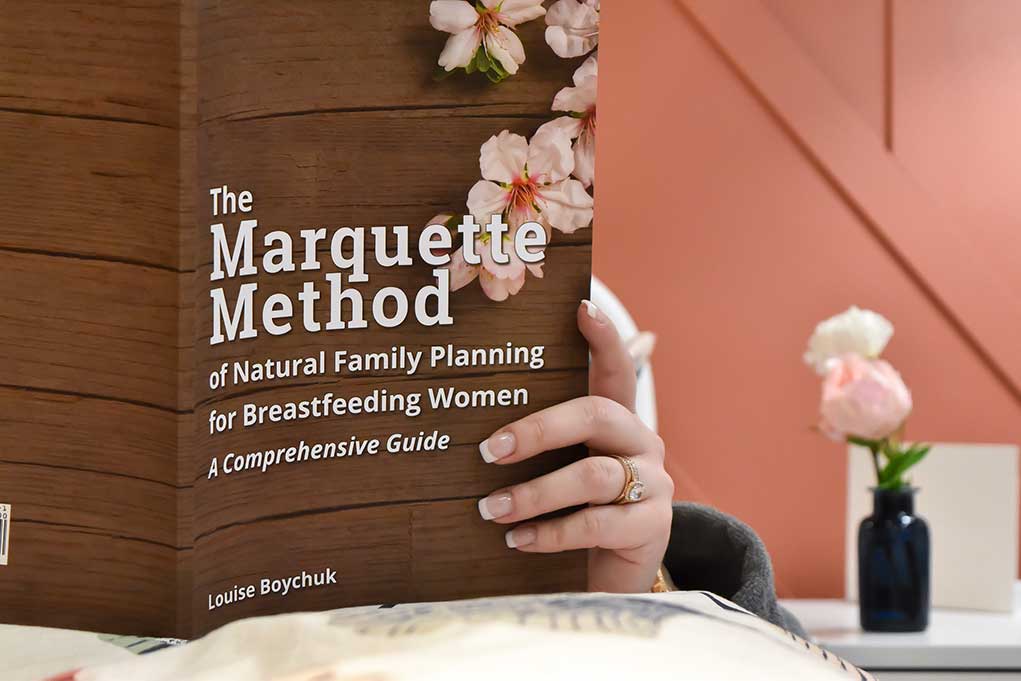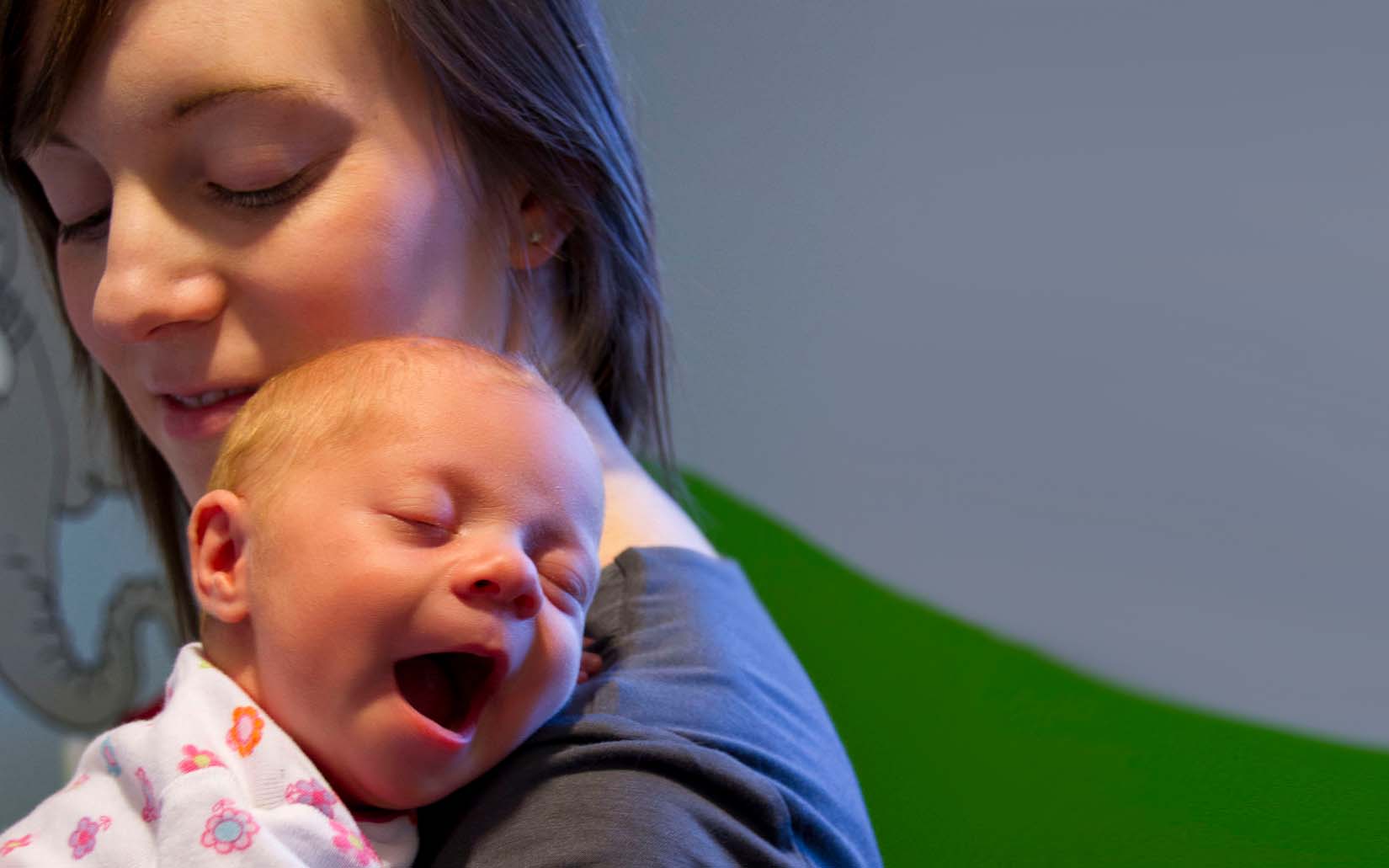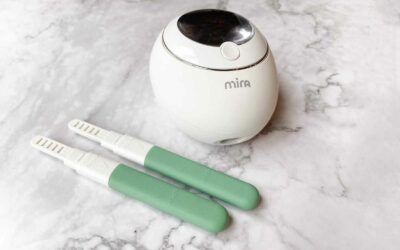So, you’re back to the drawing board… researching NFP methods and trying to figure out which one is the easiest to use and least frustrating.
It’s a big decision—it’s baby or no baby—so you want to get it right. Choosing a method of natural family planning (NFP) can be a daunting task.
When you’re re-examining your NFP decisions, it’s important to consider what went wrong on your Creighton Method journey.
Was it too time consuming? Too confusing? Too abstinent? Too expensive?
What are you hoping is different with Marquette?
I’ve been in your shoes, and I have a pretty good idea of the questions you have—let me answer them for you!
My NFP Journey from the Creighton Method to the Marquette Method
For a lot of us, our first exposure to NFP is at marriage prep, and if you’re like me, they didn’t even talk about all the different NFP methods. So when it came time to actually use NFP after the birth of our first child, we learned the Creighton Model because that’s the only method we knew. The couple teaching it was young, fun, and painted such a rosy picture of it.

I felt so betrayed when I started tracking cervical mucus. I was postpartum and breastfeeding a newborn. My foray into motherhood felt so stressful with all the diapers, middle of the night feeds, and isolation.
Cervical mucus checks multiple times a day just felt like too much. Was it 10K? Or 8CK? X1 or X2? When she was crying, did I wipe too quickly and miss a critical mucus observation?
I worried that I’d never be able to keep it up for months with perfect accuracy.
If any of this sounds familiar, then this post is for you.
When we were pregnant with our second child a friend told us about the Marquette Method of NFP. (Thank you dear friend!) She told me that with Marquette you didn’t have to track cervical mucus and that a fancy little hormone monitor would do the work. A simple urine test each morning, apply the result to the protocol, and you’re done for the day! How fantastic!
The main difference between the Marquette and Creighton approaches to NFP is how you track your fertility. The Creighton Model tracks fertility via mucus—you identify days of fertility and infertility by tracking and charting cervical mucus observations. With the Marquette Method, you measure your hormone levels directly with daily urine tests instead.
I used the Creighton Method while I was postpartum, for about 1 year. Now have been using the Marquette Method for 8 years. I’ve personally used Marquette’s postpartum protocols through 3 breastfeeding transitions, post miscarriage, and in regular cycles.
I trained to become a Marquette Method instructor in 2019. Now I’ve taught hundreds of couples how to use the method through Vitae Fertility, including many women who were, like me, switching to Marquette after first learning the Creighton Method of NFP.
Women switching from Creighton often have a lot of specific questions about how Marquette compares like…
- Is it hard to learn Marquette after learning Creighton?
- How much does it cost to use Marquette?
- How much abstinence should I expect with Marquette?
- Does Marquette work while breastfeeding?
- Does Marquette work if I have irregular cycles?
- How effective is Marquette, compared to Creighton?
- Have you taught couples coming from Creighton before?
Top 5 Reasons People Switch to Marquette NFP
1
Tracking hormones directly is more accurate and straightforward than mucus checks…
which leads to more confidence that you’re doing it right.
2
Availability for intercourse begins each morning.
Marquette does not have every-other-day or evening-only rules.
3
Once you identify peak with Marquette, you’re done tracking for that cycle.
(With Creighton you need to continue tracking every day until you get your period).
4
Urine testing once a day with Marquette replaces multiple cervical mucus checks.
And since you don’t need to track mucus, you also don’t have to worry that swimming or medications which affect mucus (like antihistamines or decongestants) will get in the way of accurate fertile observations.
5
Couples in regular cycles can start using the method from their first cycle, there’s no need to abstain while you learn.
Women in “cycle zero” (postpartum and breastfeeding, before your first period) can be up-and-running—and potentially identifying available days—within 48 hours of learning the protocols.
Is it hard to learn Marquette after learning Creighton?
Because you’ve learned Creighton, you’re already well versed in human fertility.
Marquette just focuses on different signs (the urinary hormones estrogen and LH, luteinizing hormone). And Marquette uses a tool (the Clearblue Fertility Monitor).
Many (if not most) women find tracking urinary hormones much easier than tracking cervical mucus—it’s objective and very simple to learn. Without mucus checks, there’s no need for yellow stamps. The monitor always gives one of three possible results—low, high, or peak—and nothing in between. There’s no grey area.
You can learn the Marquette Method in about an hour. In your introductory session, you’ll review some things you already know from your Creighton background (anatomy and physiology) and then go into method effectiveness rates, how the monitor works, how to use Marquette in your specific phase of fertility, and how to chart.
Charting for the Marquette Method is much simpler than charting for Creighton, which was a huge relief to me after all those confusing stickers and symbols. (Creighton has 18 different charting classifications… Marquette has just 3.)
Charting with Marquette pretty much just means taking note of your daily fertility reading (as displayed on the monitor) and writing the corresponding letter (“L” for low fertility, “H” for high fertility, “P” for peak fertility) on the corresponding day. The Clearblue Monitor stores all your fertility readings for the current cycle and the previous 6 cycles, so if you forget to fill out your chart it’s easy to look up the data in the monitor record.
There’s enough room on a Marquette Method chart for six cycles. When you need a new one, you can just print it out (it’s letter sized).
If you’re curious what Marquette Method charts look like, you can download free ones here.
How much does it cost to use Marquette?
As you know, the cost of learning the Creighton Method depends on the instructor that you’ve learned through—each Creighton instructor sets their own fees—the average cost to learn Creighton is $60 per 1-hour visit, plus extra for materials. Creighton has 8 required follow-ups in the first year. All in, Creighton tends to cost $500-$700 for the first year, and less in subsequent years, when there are fewer follow-ups.
Marquette instructors set their own fees. Different instructors charge different prices depending on what’s included in their teaching packages. Vitae Fertility charges $230 for a comprehensive one-on-one package, which includes our exclusive printed Marquette Method manuals and one year of unlimited follow-up sessions.
Generally, after your first year of use, you’ll be ready to practice Marquette independently, but if you’re not ready to practice Marquette without instructor guidance, you’ll need to renew follow-up with your instructor. The yearly follow-up renewal is $100 with instructors who work with Vitae Fertility Education.
Another difference is that with Marquette, you’ll also need to budget for supplies—the Clearblue Fertility Monitor and single-use, disposable test sticks. How many sticks you need monthly depends on how long your cycles are and what stage of fertility you’re in.
For a detailed breakdown of the up-front and ongoing costs associated with using Marquette, read our detailed blog post on the topic.
All in, for a woman who is using Marquette’s breastfeeding protocols and starts tracking at 6 weeks postpartum, Marquette will cost approximately $550 including the cost of instruction and the monitor and test sticks that you’ll use in your first year with Marquette.
If you’re in regular cycles you’re likely to use fewer sticks – and in that case, Marquette tends to cost less than Creighton. This is because most Marquette instructors offer unlimited follow-ups for a set yearly or monthly price, rather than needing to pay for each follow-up session separately.
How much abstinence should I expect with Marquette?
By using the Clearblue Monitor, the Marquette Method can pinpoint ovulation more precisely than mucus-based methods can. (Marquette tracks the estrogen rise and LH surge directly, instead of tracking mucus, which is a subjective, tertiary sign of the rise and fall of estrogen.)
For most women, more precision about the day of ovulation means they identify a shorter (more precise) fertile window—which means less days of abstinence. In regular cycles, couples who have tracked at least 6 cycles with Marquette can expect their fertile window to be at least 11 to 12 days.
And, as a bonus, many couples find that the objectivity provided by the fertility monitor gives them more confidence that they’re identifying the fertile window correctly (Fehring & Schneider, 2013).
For women who are breastfeeding and haven’t had their cycle return yet, the monitor helps to home in on the infertile days. Women who track with Marquette can expect an average of 16% of the days in cycle zero to be days of abstinence, compared to mucus tracking, which calls for an average of 52% of the days in cycle zero to be days of abstinence (Fehring, Barron & Schneider, 2005).
Does Marquette work while breastfeeding?

Yes. In fact, this is one of the times when Marquette really shines.
Some women, especially those who are “dry” a lot, like using Creighton while postpartum.
Others, like me, find tracking cervical mucus when breastfeeding confusing, which means more abstinence, and (research shows) less accuracy in identifying the fertile window (Bouchard, Blackwell, Brown, Fehring, & Parenteau-Carreau, 2018). Marquette is the only NFP method which has published effectiveness trials with postpartum, breastfeeding women (Bouchard, Fehring & Schneider, 2013; Fehring, Schneider, & Bouchard, 2017).
Marquette’s breastfeeding protocols are straightforward and simple to use. This means less room for human error. Plus, you don’t need to track all day—just test once in the morning.
Does Marquette work if I have irregular cycles?
In 2020, the Marquette researchers published a retrospective effectiveness study that showed Marquette to be 95.7% effective in typical use for women with irregular cycles (Mu, Fehring & Bouchard, 2020). Notably, this number included women who were following any of the Marquette protocols, not just the “monitor-only” approach.
That said, ideally, you’d be able to get to the root of what’s causing your irregular cycles so you can experience more regular-length cycles.
All NFP instructors—including Creighton and Marquette instructors—are trained in how to read your charts and help you identify why your cycles are irregular or long, so we can point you in the direction to get help. There are doctors trained in Marquette who can help diagnose and solve underlying problems, and of course Creighton has a well-established network of doctors trained in NaProTechnology.
Some people do choose to track with Creighton and Marquette simultaneously because their NaProTechnology provider needs Creighton charts (though some NaPro providers look at Marquette charts, too.)
If you’re hesitant, you don’t have to make the switch all at once. Many people choose to continue tracking other indicators (for example, tracking mucus or temperatures) until either they gain confidence with the monitor or as a second check, to confirm ovulation. Marquette Method instructors are trained in how to track and use all the fertile signs. It’s a multi-indicator method, if desired.
Most people do, however, use the monitor-only form of Marquette. Why? Because it’s the simplest and Marquette’s own research shows it to be the most effective, both in perfect use and in typical use.
How effective is Marquette, compared to Creighton?
Creighton measures its effectiveness rates in a non-standard way, so there’s no way to do an apples-to-apples comparison between Creighton and Marquette effectiveness rates.
Marquette does, however, have published, peer-reviewed research (the gold standard in the scientific community) which separates out pregnancies by typical use and perfect use, the way other medical interventions are measured.
- Marquette’s effectiveness rates for women in regular cycles – 98.4% effective in perfect use, 98% effective in typical use (more info on Marquette’s regular cycles effectiveness rates.)
- Breastfeeding women – 98% effective in perfect use, 92% effective in typical use (more info on Marquette’s breastfeeding effectiveness rates.)
NFP is healthcare, and all Marquette Method instructors are required to be health care professionals with a bachelor’s degree or higher. We have a solid background in research, anatomy, and physiology. In our NFP training, we learn how hormones work with each other, and how to critically think through information. We’re empowered to tailor the method to be the best for each client.
Have you taught couples coming from Creighton before?
Yes, all the time.
Many of our clients have used another method of NFP before switching to the Marquette Method. We’re well versed in helping our client couples make this transition. We know the types of confusions that come up when someone initially trained in Creighton learns Marquette—for example, the different ways of measuring peak and concerns about Creighton’s dreaded “double peak.”
In your session, we’d be glad to put you at ease and answer all your questions about making the transition, including getting into the nitty gritty of how specific concepts you learned in your Creighton training translate into the Marquette Method methodology.
Choosing which method of NFP to use is a big decision. Choosing a new method of NFP (if the one you started with just isn’t working for you) can seem really daunting.
But you should know that you’re not alone in this … for many women, the first method they use just doesn’t end up being the one they use for their whole marriage. And that’s OK. God made us all beautifully unique, and sometimes it takes a little trial and error before you find a method of NFP that works for you and your body.
If you’re thinking about making a switch from Creighton to Marquette and have questions, please don’t hesitate to get in touch for a free, no-obligation consultation. We’d be glad to answer all of your questions and help you decide whether the Marquette Method is likely to be a good fit for you.
References
Bouchard, T., Blackwell, L., Brown, S., Fehring, R., & Parenteau-Carreau, S. (2018). Dissociation between Cervical Mucus and Urinary Hormones during the Postpartum Return of Fertility in Breastfeeding Women. The Linacre quarterly, 85(4), 399–411. https://doi.org/10.1177/0024363918809698
Bouchard, T., Fehring, R. J., & Schneider, M. (2013). Efficacy of a new postpartum transition protocol for avoiding pregnancy. Journal of the American Board of Family Medicine, 26(1), 35–44. https://doi.org/10.3122/jabfm.2013.01.12012
Fehring, R. J., & Schneider, M. (2014). Comparison of Abstinence and Coital Frequency Between 2 Natural Methods of Family Planning. Journal of midwifery & women’s health, 59(5), 528–532. https://doi.org/10.1111/jmwh.12216
Fehring, R. J., Schneider, M., & Bouchard, T. (2017). Effectiveness of an online natural family planning program for breastfeeding women. Journal of Obstetric, Gynecologic & Neonatal Nursing, 46(4), e129–e137. https://doi.org/10.1016/j.jogn.2017.03.010
Fehring, R. J., Barron, M. L., & Schneider, M. (2005). Protocol for determining fertility while breastfeeding and not in cycles. Fertility and sterility, 84(3), 805–807. https://doi.org/10.1016/j.fertnstert.2005.03.042
Mu Q., Fehring R. J. & Bouchard T. (2020) Multisite Effectiveness Study of the Marquette Method of Natural Family Planning Program. The Linacre Quarterly. doi:10.1177/0024363920957515





